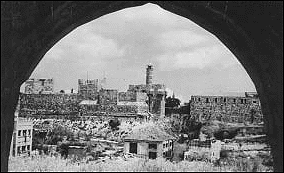|
|
|
監督・脚本・撮影・ナレーター:ロン・ハヴィリオ
Director, Script, Photography, Narration : Ron Havilio |
1950年エルサレム生まれ。父が外交官であったことから、18歳まで家族とともにパリ、イスタンブールなどで育つ。大学卒業後、写真を手掛け、また建築家として、特に古い建築物の修復を専門とする。1984年から8mmのパーソナル・フィルムを撮り始め、1986年より『エルサレム断章』に取り組む。現在エルサレム映画テレビ学校、およびエルサレム映画博物館で美術史、写真、映画、の教鞭を執り、またエルサレム合気道場の道場長でもある。 Ron Havilio was born in Jerusalem in 1950. Until the age of 18 he lived with his family in Paris, Istanbul and Yaounde, following his father's diplomatic postings. Returning to Jerusalem, he completed his university studies, practiced photography and worked in construction specializing in the renovation of old houses. In 1984-85 Havilio filmed and edited a two-hour travel diary on Super 8. Never screened, this film was the beginning of his own, personal film language. Work on Fragments Jerusalem began in 1986. Today, Havilio teaches art history, photography and film at the Jerusalem Film and Television School and the Jerusalem Cinematheque. He also heads the Aikido Institute of Jerusalem. |
 |
|
|
古今を通してエルサレムはさまざまな顔を見せる都市である。ここにはさまざまな宗教の聖地として世界から巡礼が訪れる。またエルサレムは都市自体が貴重な歴史的建築様式を見せる美術品ともいえる。国際政治でも貴重な場所であるエルサレムとはいかなる意味を持つ都市であるのか?興味は尽きない。 ロン・ハヴィリオ監督は自分の故郷であるエルサレムを記録に収めようとした。全7章から構成されるエルサレム史はときにイスラエル建国以前のパレスティナの歴史を、また両親、祖父母たちのルーツを、そしてエルサレムの写真家ヴェルナー・ブラウンによる数々の現代写真によってその都市の姿を浮き彫りにしていく。 しかし、この映画は客観的なエルサレム史に止まっていない。全7章の内容の底には歴史的な客観性が認められるがその配列は監督の恣意的な思い入れのままに作られている。エルサレムの過去と現在はまた監督とその家族にとっても分かち難い過去と現在である。家族の一員として自分の故郷を撮影することは、同時に自分の家族史を記録することになる。―主観と客観。個人と社会。―10年間に及ぶ製作期間はそれらの間隔をきわめて深い家族愛という超越的な天使の翼によって鮮やかに融合させる。すなわちこの時間と空間を越えたエルサレム史からは、鏡が反射するような形で映画を見る観客にとっての故郷とは、家族とは何か?という普遍的な命題が問いかけられているようである。6時間にわたるこの映画には人間の幸福を追い求める悠久の思索がある。 |
From antiquity to the present, Jerusalem is a city that displays many faces. People from all round the world come to make pilgrimages to this land, a land sacred for many religions. It may be said that the city of Jerusalem, with its historically precious architectural styles, is itself a work of art. What kind of meaning does Jerusalem hold--this place that is so important in world politics? This question is an unending source of curiosity. Director Ron Havilio has tried to document his native land, Jerusalem. In this seven part history, an image of the city begins to emerge from the history of Palestine before the founding of the State of Israel, from Havilio's own family history, and from the many photos by contemporary Jerusalem photographer Werner Braun. However, this film is not content to be an objective history of Jerusalem. Although historical objectivity forms the base of each of the film's seven sections, this particular arrangement of history certainly reflects the director's own idiosyncratic interpretations. For Havillo, Jerusalem's past and present are indistinguishable
from those of his family. Filming his town Jerusalem becomes synonymous
with documenting his own family's history. Subjectivity and objectivity.
The individual and society. During the 10 year period spent making
the film, the chasm between these contrasts was splendidly bridged
by the family's deep and transcendent love. Put another way, this
history of Jerusalem crosses time and space to act like a mirror;
thus the spectator is forced to reflect and to wonder what the
meaning of family and home really is. This is the universal question
that we are asked to confront. Spending six hours with this film
is a meditation on the pursuit of lasting human happiness. |
|
|
|
|
監督のことば 私の少年時代のエルサレムは、分断されていた。国境、鉄条網、コンクリートの塀、それに憎しみと無理解で切り離されていたのだ。市の中心部であるヤッファ門の周辺は物騒な無人地帯になっていた。大人になって、私は自分の生まれた世界を理解しようと努力した。過去を掘り下げ、自分の一族の足跡を、そして彼ら一人一人が激しく変化する暴力的な都市のなかで幸福を追求した様を、たどる必要を感じたのだ。私はこの個人的な道程を映画製作のなかに選び取った。画家のように、あるいは写真家のように映画を撮ること―自分の環境を記録すること。それはあたかも忘却に抗うことのようだった―映像、顔、物語、断片、放っておけば記憶から消し去られてしまうものを定着させること。この映画は私の娘たちのために、私の国のために作ったものだ。だが同時に、これが個人的で地域的なものであればこそ、より普遍的なものに到達しうるのだと私は信じる。我々は、この世界でそれぞれ自分の軌跡を残しているが、それでも同じ、はかない人間の条件を共有しているのだ。この映画を日本で見せること―初の国外上映である―は、私自身にとってはちょっとした奇跡である。永年にわたり、私は日本文化から多くを受け取ってきた。私の映画もその恩恵を多く享受している。 心の底から、ありがとう。 |
Director's Statement In my childhood Jerusalem was divided, cut off by the barbed-wire borders, concrete walls, hatred and incomprehension. The heart of the city, around Jaffa Gate, became a frightening noman's land. As an adult, I sought to understand the world into which I was born. I felt the need to dig into the past, to follow the traces of my family; their private search for happiness in a violent, changing city. I chose the personal path in filmmaking, filming like a painter or a photographer, recording my environment. It was like fighting back oblivion--fixing images, faces, stories, fragments of life that would otherwise have been erased from memory. I made this film for my daughters, for my country-- but I believe at the same time, that the more private and local a film is, the more universal is its reach. Each of us may have a unique trajectory in this world, but we share the same transitory human condition. Showing the film in Japan--the first time outside my country--is a small miracle to me. through the years I have drawn much from culture. My film benefitted greatly from it. Thank you from the bottom of my heart. |
